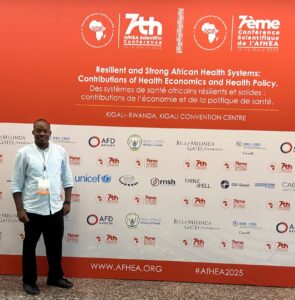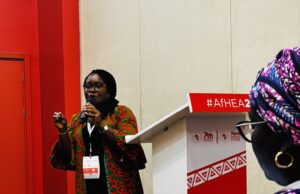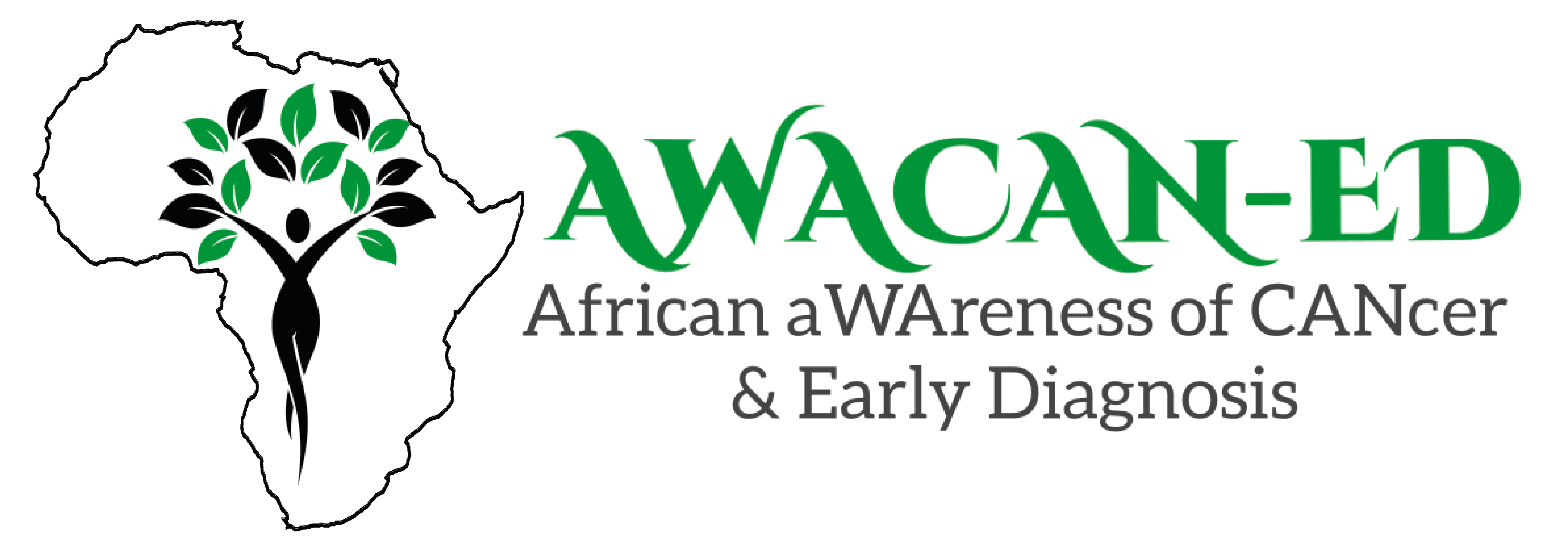Report from the 7th African Health Economics and Policy Association Conference
Two of our AWACAN-ED scholars from the University of Cape Town, Kelechi Nnene & Denis Okova, participated in the 7th African Health Economics and Policy Association (AfHEA) Conference in Kigali, Rwanda between 10th and 14th March. Here Denis reflects on their time at the conference.
Centred on the theme “Resilient and Strong African Health Systems: Contributions of Health Economics and Health Policy”, the 7th AfHEA conference brought together health economists and policy experts from ministries of health, academia, research institutions, and NGOs across the continent.
 I presented my ongoing doctoral work on catastrophic health expenditure in cervical cancer treatment in South Africa’s public sector — an area where urgent action is needed to protect the most vulnerable. Although treatment costs are largely subsidized and charged on a sliding scale based on income, the risk of catastrophic spending remains high. This is particularly due to the chronic nature of cervical cancer and the centralized delivery of treatment services, which often require patients to travel long distances. One audience member raised a thought-provoking question: “Do the numbers on out-of-pocket payments and catastrophic expenditure tell the whole story? What about the intangible costs?” I responded that the numbers indeed don’t tell the full story — and to address this gap, I am conducting in-depth interviews with cervical cancer patients to explore their lived experiences, including the emotional, social, and opportunity costs that standard economic metrics often miss. The presentation sparked valuable policy discussions on financial risk protection, the equity implications of centralized cancer care, and the need to better integrate chronic disease management into broader health financing reforms. Participants were eager to see the final results once data collection is complete.
I presented my ongoing doctoral work on catastrophic health expenditure in cervical cancer treatment in South Africa’s public sector — an area where urgent action is needed to protect the most vulnerable. Although treatment costs are largely subsidized and charged on a sliding scale based on income, the risk of catastrophic spending remains high. This is particularly due to the chronic nature of cervical cancer and the centralized delivery of treatment services, which often require patients to travel long distances. One audience member raised a thought-provoking question: “Do the numbers on out-of-pocket payments and catastrophic expenditure tell the whole story? What about the intangible costs?” I responded that the numbers indeed don’t tell the full story — and to address this gap, I am conducting in-depth interviews with cervical cancer patients to explore their lived experiences, including the emotional, social, and opportunity costs that standard economic metrics often miss. The presentation sparked valuable policy discussions on financial risk protection, the equity implications of centralized cancer care, and the need to better integrate chronic disease management into broader health financing reforms. Participants were eager to see the final results once data collection is complete.
 Kelechi presented her recently completed Master’s research on the stage-specific treatment costs of colon cancer at Groote Schuur Hospital in South Africa. Her study highlighted the substantial per-patient cost burden on the provider associated with colon cancer care, with costs escalating significantly by cancer stage. Using a provider perspective, she estimated guideline-based treatment and follow-up costs, identifying major cost drivers such as surgery and prolonged postoperative hospital stays. The presentation emphasized the value of early diagnosis and cost-saving potential through surgical efficiency and reduced inpatient days. One audience member asked whether these findings suggest that screening programmes for earlier detection would be cost-saving in the long run. Kelechi responded by acknowledging that while her study did not model screening directly, the sharp cost differentials by stage support the economic rationale for investment in early detection and referral systems. Her response resonated with participants interested in linking cost evidence to preventive health policy. This study also underscored the importance of reliable cost data for strategic resource allocation and the design of cost-effective cancer interventions in South Africa’s public health system.
Kelechi presented her recently completed Master’s research on the stage-specific treatment costs of colon cancer at Groote Schuur Hospital in South Africa. Her study highlighted the substantial per-patient cost burden on the provider associated with colon cancer care, with costs escalating significantly by cancer stage. Using a provider perspective, she estimated guideline-based treatment and follow-up costs, identifying major cost drivers such as surgery and prolonged postoperative hospital stays. The presentation emphasized the value of early diagnosis and cost-saving potential through surgical efficiency and reduced inpatient days. One audience member asked whether these findings suggest that screening programmes for earlier detection would be cost-saving in the long run. Kelechi responded by acknowledging that while her study did not model screening directly, the sharp cost differentials by stage support the economic rationale for investment in early detection and referral systems. Her response resonated with participants interested in linking cost evidence to preventive health policy. This study also underscored the importance of reliable cost data for strategic resource allocation and the design of cost-effective cancer interventions in South Africa’s public health system.
This conference was a great platform to engage with fellow health economists and policymakers committed to advancing equitable health systems across Africa.
We are inspired by the potential to reduce suffering and drive meaningful change through cancer-focused health economics research that informs policy and strengthens health systems.
We owe a debt of gratitude to the AfHEA, the University of Cape Town and the NIHR for contributing towards our attendance at this conference.

